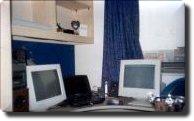
Computers to be driven purely off the iPod/Handheld device
 magine yourself the following scenario: To start up your computer you connect an iPod (or any other large-storage mobile device) to your (x86-based) work computer, which then launches the operating system (currently Knoppix Linux) from the iPod. It uses the processor and memory of the local machine rather than the iPod’s, which is merely used as a hard-drive. Then, once work is finished, you take your iPod home and repeat that exact same procudure, plugging in the iPod to a different computer. Not only can you resume your work, but your hard-drive (which contains everything that is personalised) gives you an identical environment, i.e. you have all your recent files, browser cookies, desktop settings, etc.
magine yourself the following scenario: To start up your computer you connect an iPod (or any other large-storage mobile device) to your (x86-based) work computer, which then launches the operating system (currently Knoppix Linux) from the iPod. It uses the processor and memory of the local machine rather than the iPod’s, which is merely used as a hard-drive. Then, once work is finished, you take your iPod home and repeat that exact same procudure, plugging in the iPod to a different computer. Not only can you resume your work, but your hard-drive (which contains everything that is personalised) gives you an identical environment, i.e. you have all your recent files, browser cookies, desktop settings, etc.
That vision is now real as IBM exploit the iPod for this purpose. The device could, in principle, be a Palm LifeDrive, which makes the exception among modern PDA‘s since it exploits very high data capacity. The large-sized hard-drive and high bandwidth (USB/FireWire) make it possible to use your machine merely as a host (computation, display, and peripherals), while your data (operating system, files and applications) always remain in your pocket. From an article just published in CNET:
The virtual computer user environment setup is called SoulPad, and consumers install it from a x86-based home or office PC. SoulPad uses a USB (universal serial bus) or FireWire connection to access the network cards for connecting to the Internet, the computer’s display, the keyboard, the main processor and the memory, but not the hard disk.
Also worth mentioning is the prospect for running your favourite operating system and programs to access your data on any computer. You could even use a workstation at your local library cluster. Plug in your mobile device and use the computer as if it was yours. This considerable step can give a major boost to devices such as the iPod and the LifeDrive. Perhaps Jeff Hawkins, Palm co-founder and R&D chief, had substance in his vision of the “Life Manager”. Could this be what Palm had in mind when switching to Linux?
On a less enthusiastic note, the entire idea of protable high-volume storage is not brand new. For quite some time it has been possible to install hard-drive housing units in one computer and slide in different hard-drives that suit different users of the same computer. This essentially meant that computers came without a hard-drive; hard-drives were provided by the users. However, with a handhelds like the LifeDrive, several major advantages spring to mind:
- Size, which is a major pro
- The ability to view and edit data on the go, unlike just carrying a ‘black box’
- Internet connectivity
- Infra-red communication
Cited by: PalmAddict

 he Computer Business Review reports that Yahoo will soon join the VoIP market and target the hugely popular Skype. VoIP, which has become synonymous with Skype, is a method/service allowing telephone calls to be made over the Internet, making such calls virtually free. With a standard telephone connected to a standard line, call fares are very low too. In the latter case, international call fares equate to these of local calls.
he Computer Business Review reports that Yahoo will soon join the VoIP market and target the hugely popular Skype. VoIP, which has become synonymous with Skype, is a method/service allowing telephone calls to be made over the Internet, making such calls virtually free. With a standard telephone connected to a standard line, call fares are very low too. In the latter case, international call fares equate to these of local calls.






 Filed under:
Filed under: 

 magine yourself the following scenario: To start up your computer you connect an iPod (or any other large-storage mobile device) to your (x86-based) work computer, which then launches the operating system (currently Knoppix Linux) from the iPod. It uses the processor and memory of the local machine rather than the iPod’s, which is merely used as a hard-drive. Then, once work is finished, you take your iPod home and repeat that exact same procudure, plugging in the iPod to a different computer. Not only can you resume your work, but your hard-drive (which contains everything that is personalised) gives you an identical environment, i.e. you have all your recent files, browser cookies, desktop settings, etc.
magine yourself the following scenario: To start up your computer you connect an iPod (or any other large-storage mobile device) to your (x86-based) work computer, which then launches the operating system (currently Knoppix Linux) from the iPod. It uses the processor and memory of the local machine rather than the iPod’s, which is merely used as a hard-drive. Then, once work is finished, you take your iPod home and repeat that exact same procudure, plugging in the iPod to a different computer. Not only can you resume your work, but your hard-drive (which contains everything that is personalised) gives you an identical environment, i.e. you have all your recent files, browser cookies, desktop settings, etc.
 venturous article from Softpedia makes speculations with regards to
venturous article from Softpedia makes speculations with regards to 




















 Content spam grows worryingly fast. This new type of spam shows its face in a form which is different from spam that we very well know as uninvited E-mail. Such spam is placed on the Web and later infiltrates search engine results pages (SERP’s). If you recently came across a page full of links and ads that did not provide useful information, you would probably understand what content spam is.
Content spam grows worryingly fast. This new type of spam shows its face in a form which is different from spam that we very well know as uninvited E-mail. Such spam is placed on the Web and later infiltrates search engine results pages (SERP’s). If you recently came across a page full of links and ads that did not provide useful information, you would probably understand what content spam is. When a general audience observes Windows being used everywhere, it is natural to assume it is the best operating system. In reality, very few people have seen alternatives to Windows. Even fewer people had a prolonged hands-on experience with another platform. Microsoft are exploiting the placebo effect, giving unnecessary and unproductive software, which you truly think helps you, but only helps lock your data to one particular vendor. Often the vendor destroys the very same community that it pretends to cherish. One day in the future, people come to realise that better software is out there and that influence of the group has shifted its balance. But is it too late once data has been locked to a vendor and habits become less reversible?
When a general audience observes Windows being used everywhere, it is natural to assume it is the best operating system. In reality, very few people have seen alternatives to Windows. Even fewer people had a prolonged hands-on experience with another platform. Microsoft are exploiting the placebo effect, giving unnecessary and unproductive software, which you truly think helps you, but only helps lock your data to one particular vendor. Often the vendor destroys the very same community that it pretends to cherish. One day in the future, people come to realise that better software is out there and that influence of the group has shifted its balance. But is it too late once data has been locked to a vendor and habits become less reversible?